Looking back at 19 years of the Tour Down Under on SA roads
THE Tour Down Under has gone from humble origins to the first UCI World Tour event held outside Europe in the space of 19 years. We take a look back at two decades of the race as the planet’s best cyclists prepare to touch down in SA again.
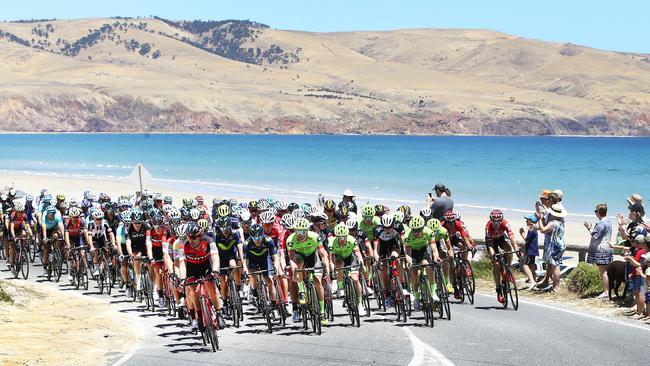
Sport
Don't miss out on the headlines from Sport. Followed categories will be added to My News.
THE cream of international cycling talent has descended on South Australia to battle it out for glory on the state’s roads for each of the past 19 years.
But how has the Santos Tour Down Under gone from humble origins to attracting more than 800,000 spectators annually and the first UCI World Tour race held outside Europe?
We take a look back at two decades of the tour as the planet’s best riders again prepare to touch down in Adelaide for the January 13 start.
1999
The Tour Down Under is launched with the support of then SA Premier John Olsen. It is seen as an effort to fill the gap in the state’s sporting calendar left by the Australian Formula One Grand Prix moving from Adelaide to Melbourne. The inaugural six-stage race is won by SA rider Stuart O’Grady, who holds off Dane Jesper Skibby and Swede Magnus Backstedt to claim overall honours.
2000
A 180km leg from Glenelg to McLaren Vale, still the longest in the tour’s history, is included in its second edition, which is taken out by Frenchman Gilles Maignan. The AG2R Prévoyance rider does not win an individual stage, but his consistent performances throughout are enough for him to edge out O’Grady by 12 seconds. Guillame Auger (top sprinter) and Sandy Casar (best young rider) also taste success for France.
2001
Hometown favourite O’Grady becomes the first person to secure two TDU titles as he edges out German Kai Hundertmarck by two seconds in the overall standings. The sprint specialist and dual Tour de France stage winner is joined on the dais by an all-Australian cast. Graeme Brown claims the sprint honours, Robert Tighello is crowned King of the Mountain and Gene Bates is named best young rider.
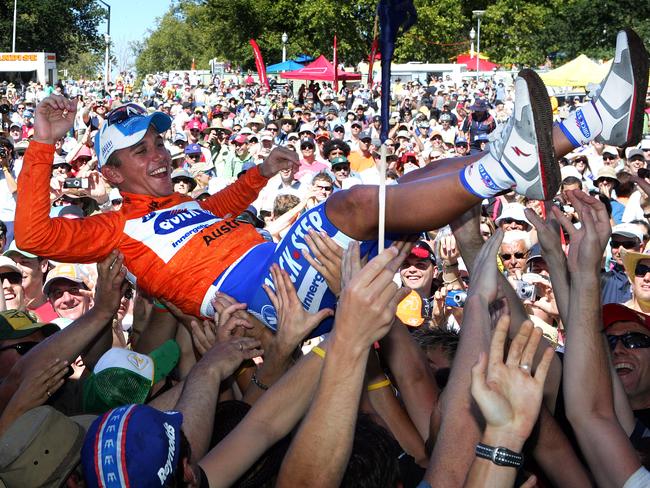
2002
Michael Rogers borrows a spectator’s bike to replace his damaged machine after he is hit by a media motorcycle during stage five from Gawler to Tanunda. Remarkably the Australian Institute of Sport rider steers the stand-in bike to a second-place stage finish in one of the most bizarre moments in TDU history. The result is enough to elevate NSW-born Rogers to the summit of the overall standings ahead of Russian Alexander Bocharov. He holds on to top spot on the way to his sole tour triumph.
2003
Spaniard Mikel Astarloza becomes just the second non-Australian winner of the event. The AG2R Prévoyance rider finishes the tour locked on the same time as Lennie Kristensen, but he squeezes out the Dane on a countback of stage placings. Future Tour de France champion Cadel Evans makes his first mark on the TDU, claiming the King of the Mountain classification just two years after switching permanently from mountain biking to road cycling.
2004
Another star unearthed at the tour – Philippe Gilbert scoops the young rider title. The Belgian goes on to win the World Road Race Championship eight years later after becoming one of only two riders to claim the three Ardennes classics – the Amstel Gold Race, La Flèche Wallonne and Liège–Bastogne–Liège – in a single season in 2011. Dutch-born Australian veteran Patrick Jonker takes home the overall crown for UniSA at the ripe age of 34.
2005
The UCI promotes the TDU to the highest ranking event outside of cycling’s traditional European powerbase. Spaniard Luis Leon Sanchez wins the general classification from Liberty Seguros-Würth teammate Allan Davis. Sanchez later claims the 2009 Paris-Nice and wins four Tour de France stages throughout his career. Australian sprint star Robbie McEwen tops the points standings for a record third time.
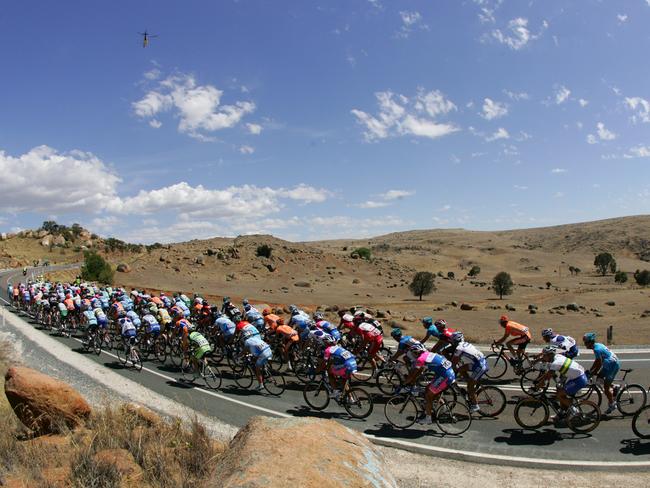
2006
Riders struggle in oppressive conditions as temperatures top 42C on four consecutive days during the hottest TDU on record. Australia’s Simon Gerrans begins his love affair with the event, becoming the first overall winner to take home the iconic ochre jersey after it replaces the traditional yellow leader’s colours.
2007
Competitors encounter a completely different environmental challenge: the wettest tour ever. Unseasonal torrential rain hits stages four and five in particular as Swiss rider Martin Elmiger claims race honours in front of UniSA’s Karl Menzies by just three seconds. Elmiger trails Menzies for the opening three stages of the event, but a third-place finish on the Old Willunga Hill propels the AG2R Prévoyance rider to victory. Australia’s Simon Clarke is named the best young rider, while Frenchman Laurent Brochard is top sprinter.
2008
The TDU is awarded UCI Pro Tour status, becoming the first non-European race to do so. The achievement cements the tour’s position as the first major event on the international cycling calendar each year. German star André Greipel, riding for Team High Road, wins his first tour.
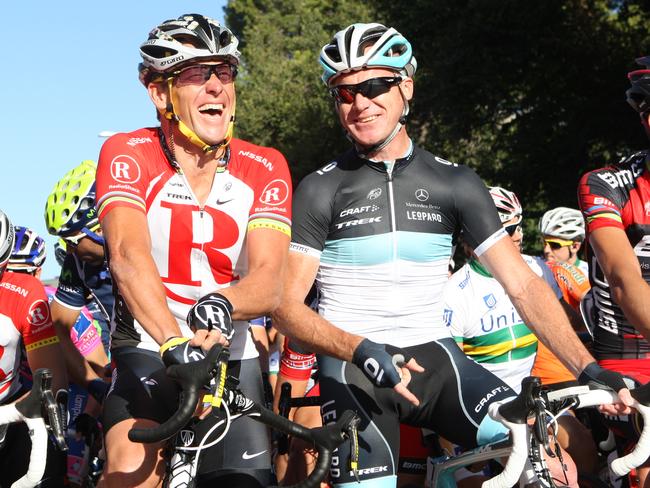
2009
Queenslander Davis, the only rider to have competed in the first 11 editions of the tour, claims overall victory ahead of O’Grady. Lance Armstrong makes his return to professional cycling at the event, boosting visitor numbers and almost doubling the tour’s economic impact from $17.3 million to $39 million in the space of 12 months. The American competed in three consecutive TDUs, before being stripped of his seven Tour de France titles in 2012 for doping.
2010
Greipel becomes the second rider after O’Grady to win the TDU twice, taking out three of the race’s sprint finishes to hold off 2005 champion Sánchez. Now riding for Team HTC–Columbia, Greipel also claims the points classification for the second time.
2011
The tour attracts its largest crowd in 13 years as an estimated 780,000 people line the streets of Adelaide and its surrounding areas to witness WA-born Cameron Meyer secure the overall triumph. Fellow Australian Matthew Goss finishes just two seconds back in the general classification, but claims the sprinter’s jersey. The race becomes part of the UCI World Tour.
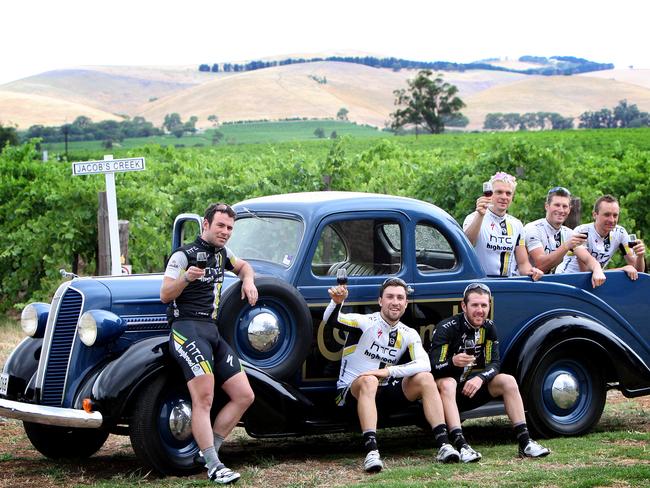
2012
Australia’s first elite professional cycling team Orica-GreenEdge debuts at the TDU. The inaugural squad marks the occasion by helping its member Gerrans claim his second overall victory on SA roads, six years on from his first. Spain’s Alejandro Valverde, competing in his first race since serving a two-year doping ban, records the same total time as Gerrans, but is relegated to second due to his inferior record of stage placings throughout the week.
2013
Gilbert and 2010 Tour de France winner Andy Schleck headline the field of world-class cyclists to arrive in SA for the 15th edition of the TDU. But it is unheralded Dutchman Tom-Jelte Slagter who grabs top honours, after winning the third-stage sprint finish into Stirling thanks to a brave attack on the final hill climb. The Blanco Pro Cycling rider then finishes just behind Gerrans on the Old Willunga Hill the following day to all but secure the overall victory.
2014
Gerrans makes it a hat-trick of TDU wins after finishing the race just one second ahead of fellow Australian Cadel Evans in a thrilling finish. Victorian Gerrans claims the opening stage from Nuriootpa to Angaston, but has to wait until the penultimate leg of the tour to gain possession of the leader’s ochre jersey when he finishes 10 seconds behind Richie Porte at Willunga. Gerrans also holds off a field packed with sprinting quality to claim his maiden points classification triumph.
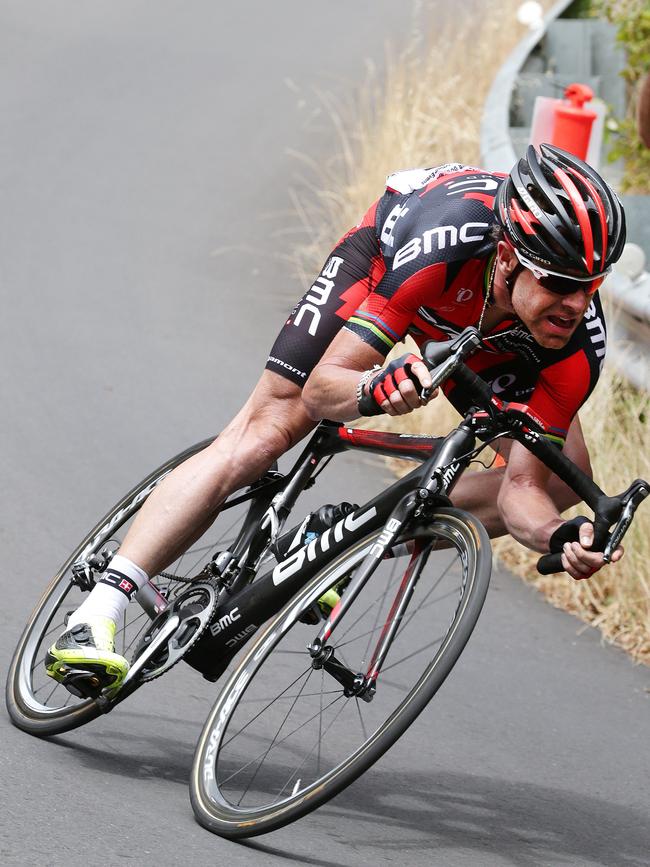
2015
Evans completes his final UCI World Tour event in Adelaide, finishing third at the TDU as his BMC teammate Rohan Dennis claims overall honours. Dennis wins stage three from Norwood to Paracombe on his way to becoming the first SA-born tour winner since O’Grady in 2001. Porte, riding for Team Sky, completes an all-Australian podium as he finishes two seconds behind Dennis.
2016
Gerrans continues his TDU domin-ance by winning the event for an unprecedented fourth time and taking home his second sprinters’ jersey. Gerrans’ Orica-GreenEdge stablemate Caleb Ewan also tastes victory in the final stage of the event on the Adelaide CBD street circuit. The triumph ensures an Australian wins every leg of the tour for just the second time in the event’s history. Porte improves one spot from 12 months previous to claim second ahead of Colombia’s Sergio Henao.
2017
Tasmanian Porte succeeds on two of the race’s three climbs to finally win his first TDU. Orica-SCOTT gun Ewan collects four stage victories to be crowned best sprinter and extend Australia’s recent stranglehold on major honours. UCI World Road Race champion Peter Sagan wears the rainbow jersey on SA roads, returning to the race for the first time since 2010. An estimated 840,000 cycling fans take to the streets throughout the six-day event, including more than 43,000 interstate and overseas visitors.



